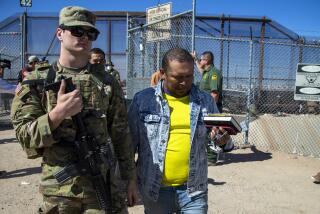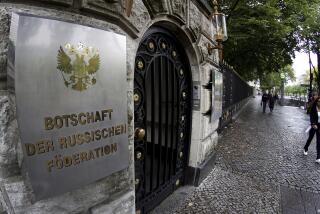U.S. to Close Embassy in Kabul as Situation Grows Precarious
- Share via
WASHINGTON — Secretary of State James A. Baker III, on his first day on the job, decided Thursday to close the U.S. Embassy in Kabul amid rising turmoil during a Soviet troop withdrawal from Afghanistan, a U.S. official said.
The U.S. diplomatic contingent in Kabul had already been reduced to fewer than 10 officers and security guards. Their situation is considered precarious in light of a bitter civil war between the pro-Moscow government and U.S.-armed guerrillas.
The U.S. official, speaking on condition of anonymity, said the pullout will be carried out over several days.
All 50,000 Soviet troops still in the war-torn country are supposed to leave by Feb. 15 under the Geneva accords signed last April. Their departure is expected to remove a stabilizing influence on the Kabul government. The guerrillas, meanwhile, are likely to redouble their offensive against government forces no longer backed by the Soviet army.
The Reagan Administration, in its final days, pondered whether to abandon the embassy or to leave the decision to its successors. The U.S. official said it was left up to Baker, and he decided to close the embassy on his first day on the job.
Apart from the small diplomatic contingent, there are fewer than 20 private U.S. citizens in Afghanistan. They have been encouraged to leave, and the State Department has urged Americans not to travel to the country.
This morning, Japan decided to join the United States and evacuate its three-member Kabul embassy.
Wednesday, the mayor of Kabul said the capital had a three-month supply of food and fuel in case of a guerrilla siege. Soviet soldiers handed out emergency rations. Soviet cargo planes began flying loads of flour and fuel to Kabul on Saturday. Britain’s embassy in Kabul issued warnings last week to its nationals and citizens of other countries for which it has diplomatic responsibility, including Canada, Australia and Ireland.
Saturday, the West German Embassy became the first to close. Spokesmen for others say they are considering similar action.
Other than those in embassies, most Westerners are with the International Aid Mission, a charitable organization that has operated in Afghanistan for many years. Among other things, it runs an eye hospital in Kabul.
Besides missionaries, foreigners still in Afghanistan include a few hundred diplomats, a dwindling number of Soviet civilian advisers, employees of the International Red Cross and U.N. officials.
More to Read
Sign up for Essential California
The most important California stories and recommendations in your inbox every morning.
You may occasionally receive promotional content from the Los Angeles Times.












